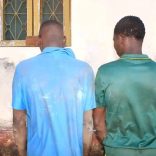Mozambique: Two detained in possession of human bones
Sofala residents keep finding dead bodies, remains of Cyclone Idai victims

Location where the population says they are finding decomposing bodies. Photo: DW
Residents of Nhamatanda district in central Mozambique’s Sofala province say the decomposing bodies of Cyclone Idai victims are surfacing and appeal to the authorities for a solution.
Residents living in the João Segredo and Muda-Nunes accommodation centres say that when go to their home areas in search of food, they find bodies in an advanced state of decomposition.
The bodies discovered by the resettled Nhamatanda population are victims of Cyclone Idai found among the rubble or covered with mud and grass, according to reports.
Those being resettled are upset at the sight, which reminds them of their suffering on the night of March 14, when they witnessed thousands being dragged off by the furious waters of Tropical Cyclone Idai.

Paulo Chimica, head of the accommodation centre in Muda-Nunes, said the situation is particularly traumatic because some of the bodies were washed in from other regions, and funerals are being performed without relatives being present.
“Given the advanced state of decomposition, it is difficult to identify the families of the bodies we’re finding here in Nhamatanda,” he says.
“Many people were swept through here, because all the houses were swallowed up by the waters and those who did not climb trees did not escape – they died. Even some of those who climbed trees died, because they fell off in the time it took [for rescue to arrive]”, the man responsible for one of the accommodation centres in Nhamatanda says.
Exposed bodies decomposed
“Even now, there are bodies in the bends of the rivers that have not been buried,” Chimica adds. “There are times when we come across human skeletons. When government authorities are told about the discovery of new bodies, they pick them up and bury them.”
“Sometimes we, as leaders at the centres, mobilise people to bury the remains. Every time we bury a body, the numbers (of volunteers) decrease, because there are many bodies buried in the low-lying areas and river banks,” he tells DW Africa.
Nelito Jone, also interviewed in Nhamatanda, says the bodies and skulls discovered there frighten the resettled population and renew the mourning and pain felt by those families who saw their relatives snatched by the waters.
“When we go to low-lying areas in search of – ears of corn, fruits, vegetables and other foods – we always find remains. And because of the remains, there’s always a bad smell,” he says.
“As soon as the rains stop, we want to rebuild in the areas we come from, but with all those bones there, we’re too afraid to,” he says. “We ask the authorities to do something to put an end to the remains dragged by the fury of the waters caused by Cyclone Idai.”












Leave a Reply
Be the First to Comment!
You must be logged in to post a comment.
You must be logged in to post a comment.